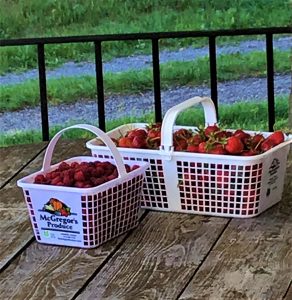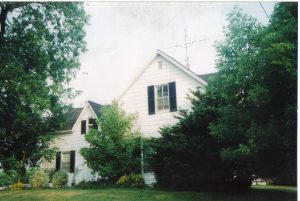
Last weekend, we spent some time in eastern Ontario, enjoying the abundance of fresh-picked fruit and homemade ice cream. How satisfying are the simple pleasures of food in season, the love and hospitality of those who had gone to the effort to entertain and sustain us.
Yes, we are in a time of social distancing, and there was an odd disconnection. Hugs were only shadow hugs, kisses just air kisses. We kept our two meters apart, but there was still community in the sharing of food on the wide porch, in the enjoyment of summer with all its pleasures, in the stories of young and old. The garden is yielding zucchini, peas, basil, and more, and its produce is generously given. In a nearby blossoming basswood bees hover, hard at work. The tree is equivalent to an acre of meadow in the gathering up of nectar for the farm’s hives.
In the early morning, before crowds arrived, there was time to gather at the nearby Madawaska for a dip. Already the day shimmered with a promise of summer heat, and the river’s ripples glinted with the sun’s new-risen light. It was a welcome refreshment for swimmers who happily splashed about.
And we had a taste of life in true simplicity for over eight hours because of a power outage after an early morning thunderstorm. You forget, once you’ve left real country living, that this means water is no longer accessible, since hydro is necessary to run the well’s pump. When electricity was restored, we were truly grateful.
In so many ways we have the the best of both worlds in technology and tradition. In this difficult time, many of us have explored so many things on-line, hunted up old recipes and cooking tips. We have taken the opportunity to re-visit the simple things and found them very good. Truly, we have many blessings.
“‘Tis the gift to be simple
‘Tis the gift to be free
‘Tis the gift to come down where we ought to be
And when we find ourselves in the place just right
‘Twill be in the valley of love and delight.”
Shaker Hymn


